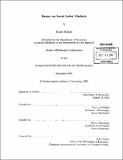Essays on local labor markets
Author(s)
Basker, Emek, 1970-
DownloadFull printable version (7.146Mb)
Other Contributors
Massachusetts Institute of Technology. Dept. of Economics.
Advisor
Daron Acemoglu and Olivier Blanchard.
Terms of use
Metadata
Show full item recordAbstract
This dissertation consists of three chapters. The first chapter explores the effect of Wal-Mart expansion on local retail employment. The phenomenal expansion of Wal-Mart provides a clean case for studying the labor-market effects of increased efficiency. I estimate the effect of Wal-Mart entry on retail employment at the county level. Using an instrumental-variables approach to correct for both measurement error in entry dates and possible endogeneity of the timing of entry, I find that Wal-Mart entry increases retail employment by 100 jobs in the year of entry. Half of this gain disappears over the next five years, leaving a statistically significant net gain of 50 jobs at the five-year horizon. The decline in retail employment in the years immediately following entry is associated with the closing of both small and large retail establishments. At the same time, retail employment in neighboring counties declines by approximately 30 jobs, and wholesale employment in the entered county declines by a similar number. In the second chapter, I explore several differences between the migration and job-search behavior of workers with different levels of education, both theoretically and empirically. I start with two stylized facts. First, the propensity to migrate increases with education. Second, conditional on migration, the probability that a worker moves with a job in hand (rather than moving to search for a job in the new location) also increases with education. I present a simpleconsumer-choice model that captures these facts and generates a number of predictions about differential sensitivity of migration to observed variables by education. These predictions are verified using CPS data. (cont.) The third chapter documents a small permanent effect of idiosyncratic shocks to agricultural revenues - due to variation in crop yields and crop prices - on the number of farms in the United States. Using county-level data on the number of farms by size and ownership structure (family-owned vs. corporate-owned), I show that following negative deviations from expected revenue, the number of farms declines; this decline is disproportionaly due to a decline in the numbers of small and/or family-owned farms.
Description
Thesis (Ph. D.)--Massachusetts Institute of Technology, Dept. of Economics, 2002. Includes bibliographical references.
Date issued
2002Department
Massachusetts Institute of Technology. Department of EconomicsPublisher
Massachusetts Institute of Technology
Keywords
Economics.